-
 Bitcoin
Bitcoin $112400
-1.07% -
 Ethereum
Ethereum $3409
-3.27% -
 XRP
XRP $2.784
-6.60% -
 Tether USDt
Tether USDt $0.9997
-0.03% -
 BNB
BNB $739.3
-2.09% -
 Solana
Solana $158.0
-2.90% -
 USDC
USDC $0.9998
-0.02% -
 TRON
TRON $0.3213
-0.94% -
 Dogecoin
Dogecoin $0.1929
-5.01% -
 Cardano
Cardano $0.6974
-2.82% -
 Hyperliquid
Hyperliquid $36.69
-2.31% -
 Sui
Sui $3.327
-4.80% -
 Stellar
Stellar $0.3672
-5.18% -
 Chainlink
Chainlink $15.65
-3.07% -
 Bitcoin Cash
Bitcoin Cash $525.0
-1.68% -
 Hedera
Hedera $0.2291
-6.00% -
 Avalanche
Avalanche $20.91
-2.96% -
 Ethena USDe
Ethena USDe $1.000
0.00% -
 Toncoin
Toncoin $3.520
-1.12% -
 UNUS SED LEO
UNUS SED LEO $8.968
0.14% -
 Litecoin
Litecoin $105.7
0.26% -
 Shiba Inu
Shiba Inu $0.00001181
-1.79% -
 Polkadot
Polkadot $3.492
-2.08% -
 Uniswap
Uniswap $8.800
-3.10% -
 Dai
Dai $0.9999
-0.01% -
 Monero
Monero $289.9
-3.17% -
 Bitget Token
Bitget Token $4.243
-1.27% -
 Pepe
Pepe $0.00001006
-3.67% -
 Cronos
Cronos $0.1248
-5.68% -
 Aave
Aave $249.7
-2.50%
how to buy bitcoin spot etf in india
Due to regulatory uncertainty, Bitcoin spot ETFs aren't currently available in India; however, investors can explore alternatives like direct Bitcoin purchases on Indian exchanges, crypto mutual funds, or international ETFs (with added complexities).
Mar 24, 2025 at 05:49 pm

How to Buy Bitcoin Spot ETF in India: A Comprehensive Guide
Currently, there are no Bitcoin spot ETFs (Exchange Traded Funds) officially approved and available for trading on Indian stock exchanges. This is a significant difference compared to some other global markets where Bitcoin spot ETFs are readily accessible. The absence stems from regulatory uncertainties surrounding cryptocurrencies in India. The Securities and Exchange Board of India (SEBI) is actively evaluating the regulatory framework for crypto assets, including the potential for Bitcoin ETFs.
Understanding the Regulatory Landscape
The Indian government's stance on cryptocurrencies is evolving. While not outright banned, cryptocurrencies are subject to taxation and face significant regulatory scrutiny. The lack of a clear regulatory framework for crypto assets is the primary reason behind the non-existence of Bitcoin spot ETFs in India. SEBI's role is crucial, as it oversees the regulation of securities markets and would need to approve any Bitcoin ETF before it could be listed. The regulatory hurdles involve concerns about investor protection, market manipulation, and the volatile nature of cryptocurrencies.
Exploring Alternative Investment Options
While a dedicated Bitcoin spot ETF is currently unavailable, Indian investors can still explore alternative avenues to gain exposure to Bitcoin. These alternatives carry their own set of risks and complexities, and it's crucial to understand them before proceeding. These options should be considered carefully and only after thorough research into their associated risks.
- Investing Directly in Bitcoin: This involves buying and holding Bitcoin directly through cryptocurrency exchanges. This offers direct exposure but entails higher risk due to price volatility and the need to secure your private keys. You'll need to navigate KYC/AML regulations on Indian exchanges.
- Investing in Crypto Mutual Funds: Some mutual funds in India offer exposure to cryptocurrencies, though these may not solely focus on Bitcoin. These funds typically invest in a basket of cryptocurrencies, diversifying risk but potentially reducing direct Bitcoin exposure. Understanding the fund's investment strategy is paramount.
- Investing in Global Bitcoin ETFs (with caveats): Investors could theoretically consider investing in Bitcoin spot ETFs listed on foreign exchanges. However, this involves navigating international regulations, currency exchange complexities, and potential tax implications. This approach requires a high degree of financial literacy and understanding of international regulations.
- Grayscale Bitcoin Trust (GBTC): While not an ETF, GBTC trades on US stock exchanges and offers exposure to Bitcoin. However, similar to foreign ETFs, it involves navigating international investment regulations and dealing with currency conversion. Remember that GBTC often trades at a premium or discount to the net asset value (NAV) of its Bitcoin holdings.
Navigating the Cryptocurrency Exchanges in India
If you choose to invest directly in Bitcoin, you'll need to use a cryptocurrency exchange operating in India. These exchanges are subject to Indian regulations and require KYC (Know Your Customer) and AML (Anti-Money Laundering) compliance.
- Choosing a Reputable Exchange: Thoroughly research and select a reputable and secure cryptocurrency exchange that operates legally in India. Look for reviews and ensure they have robust security measures in place.
- KYC/AML Compliance: Be prepared to undergo KYC/AML verification procedures, which involve providing identification documents and potentially other personal information.
- Security Measures: Protect your account credentials and utilize two-factor authentication (2FA) for enhanced security. Understand the risks associated with storing cryptocurrencies and choose a secure storage method.
Tax Implications of Bitcoin Investment in India
Currently, profits from cryptocurrency trading in India are taxed as income from capital gains. This means that any profits you make from buying and selling Bitcoin are taxable, and the tax rate depends on the holding period. Short-term capital gains (assets held for less than a year) are taxed at higher rates than long-term capital gains. It is crucial to understand the tax implications before investing. Consult a tax professional for specific guidance.
Understanding the Risks of Bitcoin Investment
Investing in Bitcoin or any cryptocurrency carries significant risk. Bitcoin's price is highly volatile, and its value can fluctuate dramatically in short periods. Market manipulation and security breaches are also potential risks to consider. Never invest more than you can afford to lose.
Frequently Asked Questions
Q: When will Bitcoin spot ETFs be available in India?
A: There is no definite timeline. The availability depends on SEBI's regulatory approvals and the evolution of the overall regulatory landscape for cryptocurrencies in India.
Q: Are there any other ways to gain Bitcoin exposure in India besides direct investment?
A: Yes, you can consider crypto mutual funds or indirectly through global ETFs (with the understanding of associated complexities and risks).
Q: What are the tax implications of Bitcoin investment in India?
A: Profits from Bitcoin trading are taxed as capital gains, with the tax rate depending on the holding period. Consult a tax advisor for personalized guidance.
Q: How safe is investing in Bitcoin through Indian exchanges?
A: Choose reputable exchanges with robust security measures and always practice good security hygiene, including using 2FA.
Q: What are the risks associated with investing in Bitcoin?
A: Bitcoin is highly volatile, and its price can fluctuate dramatically. Market manipulation and security breaches are also potential risks. Only invest what you can afford to lose.
Disclaimer:info@kdj.com
The information provided is not trading advice. kdj.com does not assume any responsibility for any investments made based on the information provided in this article. Cryptocurrencies are highly volatile and it is highly recommended that you invest with caution after thorough research!
If you believe that the content used on this website infringes your copyright, please contact us immediately (info@kdj.com) and we will delete it promptly.
- BlockDAG, SEI, Ethena: Top Crypto Performers Under the Microscope
- 2025-08-03 10:50:16
- Bitcoin Blasts Past $119K: How Institutional Adoption and Macro Shifts Fuel the Fire
- 2025-08-03 10:55:16
- Crypto, Grok, and August: Decoding the Latest Trends and Insights
- 2025-08-03 11:10:16
- Crypto, Phishing, and Your Wallet: A New Yorker's Guide to Staying Safe
- 2025-08-03 10:30:16
- Troller Cat Meme Coin Presale Soars: A New King in the Crypto Jungle?
- 2025-08-03 10:30:16
- Grayscale, Altcoin Trust, and Mid-Cap Mania: What's the Deal?
- 2025-08-03 08:50:16
Related knowledge
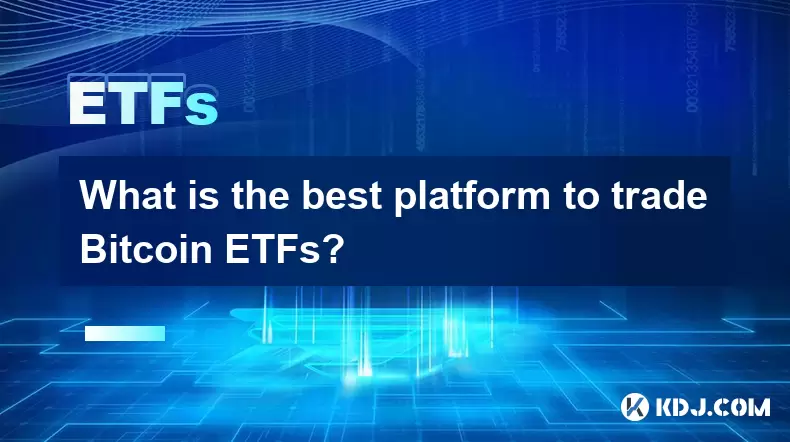
What is the best platform to trade Bitcoin ETFs?
Jul 23,2025 at 04:14am
Understanding Bitcoin ETFs and Their Role in TradingBitcoin Exchange-Traded Funds (ETFs) have gained significant traction among traditional and crypto...
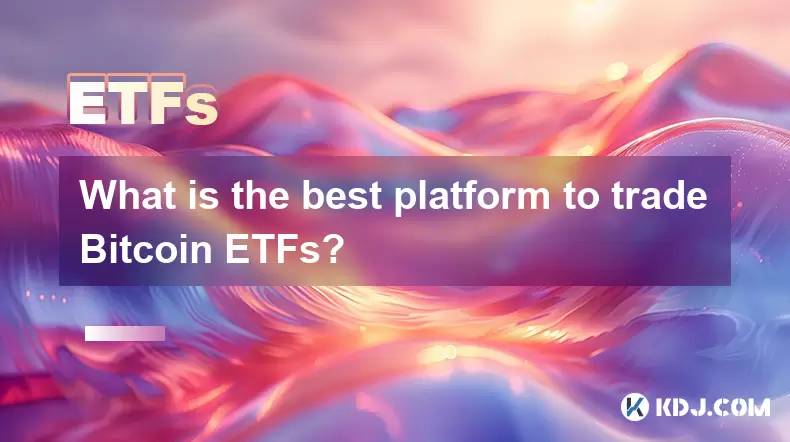
What is the best platform to trade Bitcoin ETFs?
Jul 17,2025 at 03:50pm
Understanding Bitcoin ETFs and Their Role in the MarketBitcoin Exchange-Traded Funds (ETFs) are investment vehicles that track the price of Bitcoin wi...
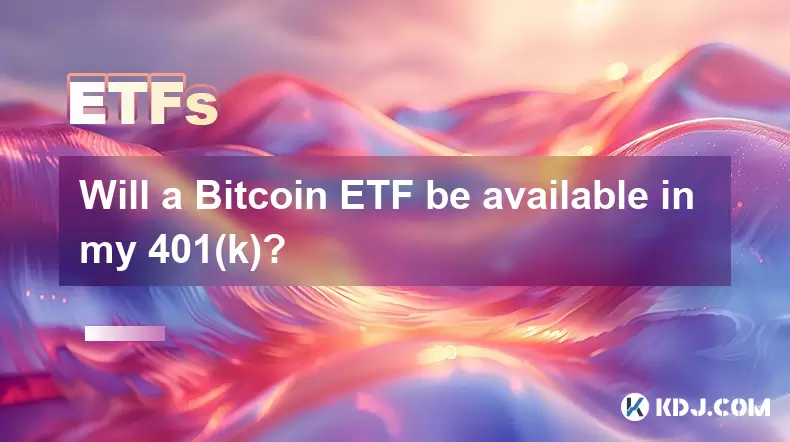
Will a Bitcoin ETF be available in my 401(k)?
Jul 17,2025 at 10:42pm
What is a Bitcoin ETF?A Bitcoin ETF (Exchange-Traded Fund) is an investment vehicle that tracks the price of Bitcoin without requiring investors to di...

Who is the authorized participant for a Bitcoin ETF?
Jul 18,2025 at 12:42am
Understanding the Role of Authorized Participants in Bitcoin ETFsIn the context of Bitcoin Exchange-Traded Funds (ETFs), an authorized participant (AP...
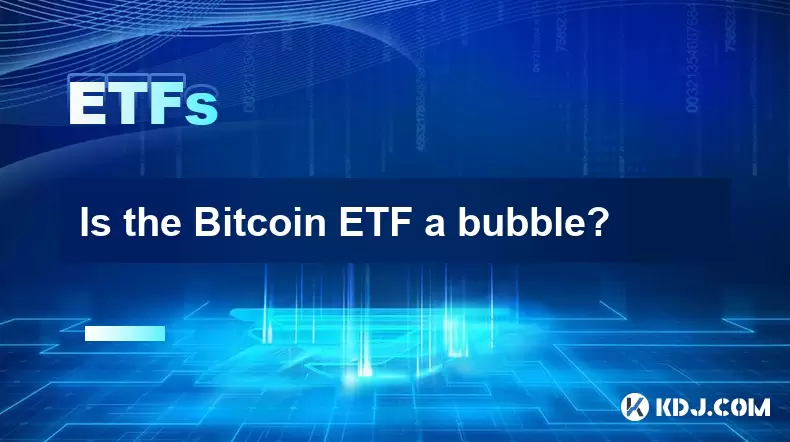
Is the Bitcoin ETF a bubble?
Jul 20,2025 at 06:57am
Understanding the Bitcoin ETF ConceptA Bitcoin Exchange-Traded Fund (ETF) is a financial product that aims to track the price of Bitcoin without requi...
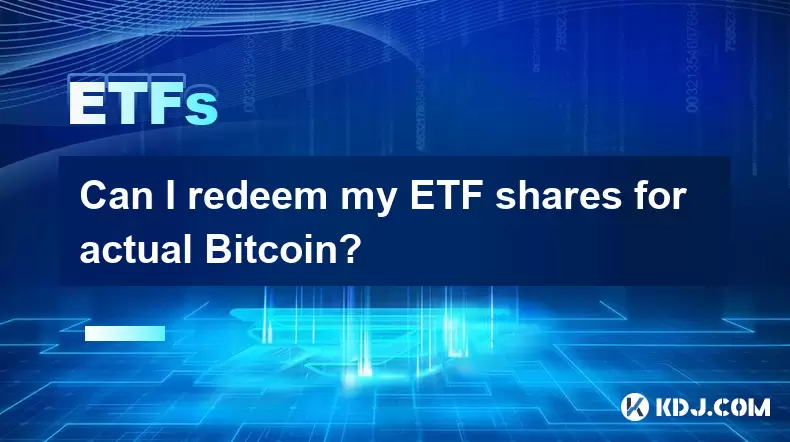
Can I redeem my ETF shares for actual Bitcoin?
Jul 17,2025 at 03:14pm
Understanding ETF Shares and Their Relation to BitcoinExchange-Traded Funds (ETFs) have become a popular investment vehicle for those looking to gain ...

What is the best platform to trade Bitcoin ETFs?
Jul 23,2025 at 04:14am
Understanding Bitcoin ETFs and Their Role in TradingBitcoin Exchange-Traded Funds (ETFs) have gained significant traction among traditional and crypto...

What is the best platform to trade Bitcoin ETFs?
Jul 17,2025 at 03:50pm
Understanding Bitcoin ETFs and Their Role in the MarketBitcoin Exchange-Traded Funds (ETFs) are investment vehicles that track the price of Bitcoin wi...

Will a Bitcoin ETF be available in my 401(k)?
Jul 17,2025 at 10:42pm
What is a Bitcoin ETF?A Bitcoin ETF (Exchange-Traded Fund) is an investment vehicle that tracks the price of Bitcoin without requiring investors to di...

Who is the authorized participant for a Bitcoin ETF?
Jul 18,2025 at 12:42am
Understanding the Role of Authorized Participants in Bitcoin ETFsIn the context of Bitcoin Exchange-Traded Funds (ETFs), an authorized participant (AP...

Is the Bitcoin ETF a bubble?
Jul 20,2025 at 06:57am
Understanding the Bitcoin ETF ConceptA Bitcoin Exchange-Traded Fund (ETF) is a financial product that aims to track the price of Bitcoin without requi...

Can I redeem my ETF shares for actual Bitcoin?
Jul 17,2025 at 03:14pm
Understanding ETF Shares and Their Relation to BitcoinExchange-Traded Funds (ETFs) have become a popular investment vehicle for those looking to gain ...
See all articles

























































































